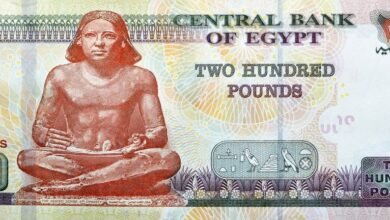Egypt banks awash in local pounds chasing scarce foreign currency
By Patrick Werr
CAIRO, Feb 21 (Reuters) – Egyptian banks have been inundated with excess Egyptian pounds over the last few weeks, central bank data shows, the result of unmet demand for foreign currency and a flood of funds from high-yield certificates of deposit at state banks, bankers and analysts said.
The excess indicates a growing scarcity of foreign currency that is putting renewed pressure on Egypt to devalue its currency, analysts said.
“It reflects the need for FX liquidity to clear the demand backlog, including at the time of devaluation,” said Monica Malik of Abu-Dhabi-based ADCB.
A central bank auction of one-week fixed-rate deposits on Tuesday attracted bids worth 1.29 trillion pounds ($41.7 billion), of which only 150 billion pounds were accepted, rolling over the same amount the central bank has held since July.
The central bank did not immediately respond to a request for comment.
The high amount of requests for the deposits is largely due to businesses collecting pounds for imports only to find banks have little foreign currency to sell, bankers said.
“It is a good indicator of the dollar crisis in Egypt,” said another analyst who asked not to be named. “Liquidity in EGP usually increases when there is a shortage in USD liquidity and vice versa.”
Egypt’s foreign currency shortage grew after the central bank fixed the currency against the dollar last March, even as money supply was mushrooming. M1, which includes currency in circulation and local currency demand deposits, jumped by 36.24% in 2023.
New funds also entered the banking system after National Bank of Egypt and Banque Misr sold 642 billion pounds in one-year savings certificates to the public in January.
The certificates, carrying a yield of up to 27%, replaced 460 billion in maturing certificates issued a year earlier.
Banks, uncertain about the fate of long-running negotiations with the International Monetary Fund, have preferred to keep their funds in short-term instruments.
At a Feb. 18 auction of 91-day treasury bills, banks submitted bids for 232.8 billion Egyptian pounds, more than all other maturities combined, with the central bank accepting only 81.5 billion at a 27.3% average yield.
Bids for 91-day bills submitted in all of January averaged only about 107 billion pounds.
Many banks have also chosen to keep funds in overnight deposits with the central bank at a 21.25% yield.
On Thursday, banks deposited 513.9 billion pounds in the overnight facility, but by Tuesday this had fallen to 211 billion.
($1 = 30.9200 Egyptian pounds)
(Reporting by Patrick Werr; Editing by Emelia Sithole-Matarise)
((patrick.werr@thomsonreuters.com;))
The views and opinions expressed herein are the views and opinions of the author and do not necessarily reflect those of Nasdaq, Inc.
Source link




